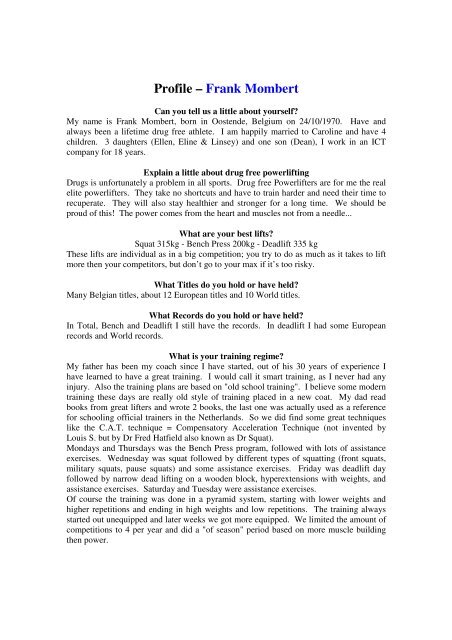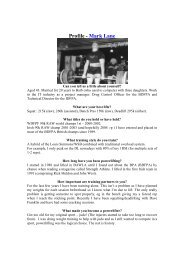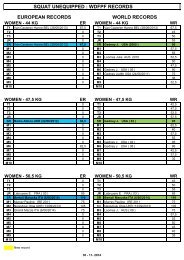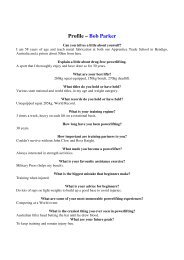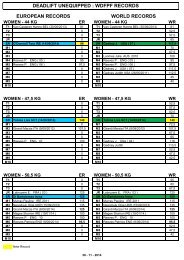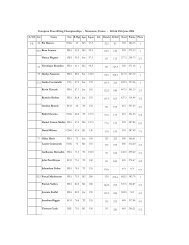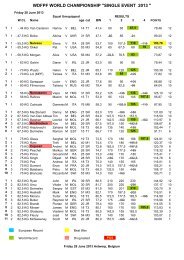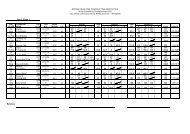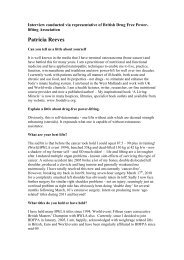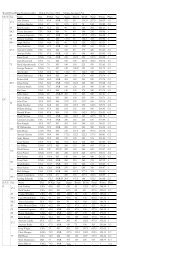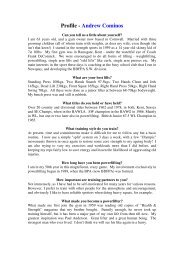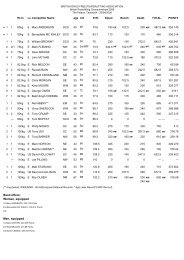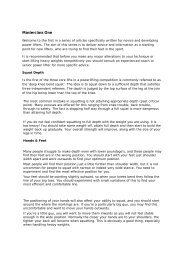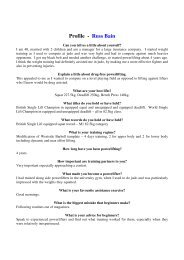Profile â Frank Mombert - bdfpa
Profile â Frank Mombert - bdfpa
Profile â Frank Mombert - bdfpa
You also want an ePaper? Increase the reach of your titles
YUMPU automatically turns print PDFs into web optimized ePapers that Google loves.
<strong>Profile</strong> – <strong>Frank</strong> <strong>Mombert</strong>Can you tell us a little about yourself?My name is <strong>Frank</strong> <strong>Mombert</strong>, born in Oostende, Belgium on 24/10/1970. Have andalways been a lifetime drug free athlete. I am happily married to Caroline and have 4children. 3 daughters (Ellen, Eline & Linsey) and one son (Dean), I work in an ICTcompany for 18 years.Explain a little about drug free powerliftingDrugs is unfortunately a problem in all sports. Drug free Powerlifters are for me the realelite powerlifters. They take no shortcuts and have to train harder and need their time torecuperate. They will also stay healthier and stronger for a long time. We should beproud of this! The power comes from the heart and muscles not from a needle...What are your best lifts?Squat 315kg - Bench Press 200kg - Deadlift 335 kgThese lifts are individual as in a big competition; you try to do as much as it takes to liftmore then your competitors, but don’t go to your max if it’s too risky.What Titles do you hold or have held?Many Belgian titles, about 12 European titles and 10 World titles.What Records do you hold or have held?In Total, Bench and Deadlift I still have the records. In deadlift I had some Europeanrecords and World records.What is your training regime?My father has been my coach since I have started, out of his 30 years of experience Ihave learned to have a great training. I would call it smart training, as I never had anyinjury. Also the training plans are based on "old school training". I believe some moderntraining these days are really old style of training placed in a new coat. My dad readbooks from great lifters and wrote 2 books, the last one was actually used as a referencefor schooling official trainers in the Netherlands. So we did find some great techniqueslike the C.A.T. technique = Compensatory Acceleration Technique (not invented byLouis S. but by Dr Fred Hatfield also known as Dr Squat).Mondays and Thursdays was the Bench Press program, followed with lots of assistanceexercises. Wednesday was squat followed by different types of squatting (front squats,military squats, pause squats) and some assistance exercises. Friday was deadlift dayfollowed by narrow dead lifting on a wooden block, hyperextensions with weights, andassistance exercises. Saturday and Tuesday were assistance exercises.Of course the training was done in a pyramid system, starting with lower weights andhigher repetitions and ending in high weights and low repetitions. The training alwaysstarted out unequipped and later weeks we got more equipped. We limited the amount ofcompetitions to 4 per year and did a "of season" period based on more muscle buildingthen power.
How long have you been powerlifting?When I was a little boy I went to competitions to watch my dad (Frans <strong>Mombert</strong>) inaction and my interest grew. I started training light assistance exercises at 13-14 and didmy first competition in my hometown at 16 years of age. Over the years we made somegood progress and had some great fun.How important are training partners to you?What made you become a powerlifter?What is your favourite assistance exercise?It’s got to be front squat, great exercise for developing a strong back, legs and waist.What is the biggest mistake that beginners make?To want large gains too fast.What is your advice for beginnersAlways listen to your coach or experienced training partner. Everybody has to learn fromtheir mistakes but learning from an experienced person is eliminating lots of mistakes.Don’t go too fast in maximums but train with reserve; follow a good program with yourwhole training cycle planned out in months of advance. Work on the form of squat,bench and deadlift. I have seen guys pulling the bar in deadlift beyond up right positionstraining there back. Don’t want too much, give it time and have fun!What are some of your most memorable powerlifting experiences?I had great fun doing competitions battling with the gentlemen Matt Saunders, LesliePilling and Mark Norton, Mike Lambert, Maxim Tikhanov, (Reading, Knokke, EdinBurgh, Lyon springs to mind). I loved to compete in the UK and US where theorganisation was always good!What is the craziest thing you ever seen in powerlifting?A guys bench pressing 150kg with his thumb up like some people do. Unfortunately hiswrist came out of balance and the bar dropped to his chest. It was so fast that the spotterscould not catch the bar. Luckily he could recover from that...and was ok after a fewweeks.What are your future goals?Although I still train, I stopped competitions for other time consuming activities.Although I still have some desire burning to compete once again. So maybe this is afuture goal.What do you think is the most important factor when it comes to upping your lifts?Train hard, train with reserve, when you feel the time is right and your training has ledyou to that moment, then you can try your max. It’s also important that you can do thisin an environment where you have 200% support of the people.
Do you think powerlifting should become an Olympic sport?There was a time that I hoped that would be the case. It would give the sport morerecognition that it deserves. But looking at it realistically, I would say NO. First drugabuse will indeed be more of a problem then ever. Second, how is the OlympicFederation going to choose the athletes out of the Powerlifting Federations? Will allfederations be taken into account with or some favoritism towards certain federations(who also do weightlifting)...?How do you see the future of powerlifting?I really hope this great sport will become a sport know to all. Some people still confusePowerlifting with Weightlifting or Body-Building. Powerlifting is treated by the medialike a second rate sport and it’s really a shame. But I wonder sometimes if theorganisations do their best to promote the sport. I have been warming up in rooms wherethere was almost no roof and it was snowing, competitions where the floor has no antislip or a nice shiny chrome bar that does not have any grip. I know it’s a amateur sport,but let’s keep some standards for the lifters, when the media sees this they classify usaccording to that. So it has a long way to go, but I did find the competitions in Englandand US to be the best. Promote your sport the best you can, it deserves all the recognitionit can get!What does your diet consist of?Normal food, on competitions sometimes Creatine and protein shakes.What makes the difference between an average lifter and a champion?A champion trains harder, never gives up. To be a champion you must have the rightsurroundings also. Your family, friends should support you 100%. And in my case agreat coach standing with you on competitions (doing knee wraps, checking scores ofcompetitors, checking form, etc…) is invaluable.What training style do you think works best?Pyramid style training towards competitions. Do not do too many competitions, 3-4maximum. Off season training is more muscle building, high repetitions, and noequipment except belt.Do you think bodybuilding exercises should be in a powerlifters’ routine?Yes, especially in off season trainingMust be creatine.What are your favourite supplements?What has powerlifting thought you?Powerlifting has been present in my family for a long time. My father startedKrachtsport Oostende in the early days and it grew out to the best gym in town inOostende. So I grew up with the sport, it has taught me many things, but self disciplineand hard work always pays off in the end!
What does powerlifting mean to you?Powerlifting has given me fantastic memories that I shared with my dad/coach. Gettingthat World title or that record gives you a great feeling and it’s great to be supported byyour environment. Great times, we have made many friends all over the world and I willalways hold a place in my heart for the sport.


